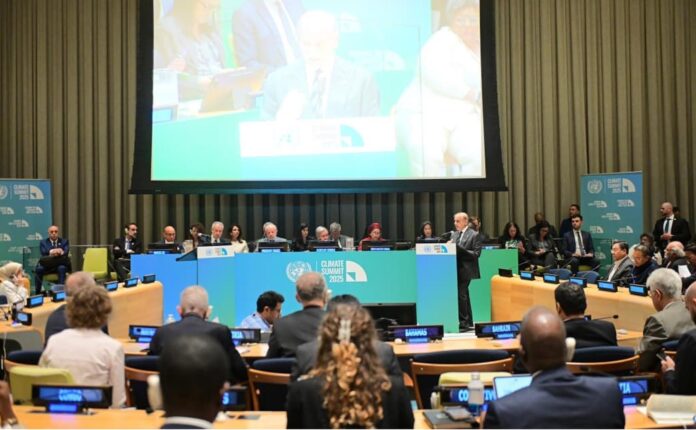UNITED NATIONS: Pakistan’s Prime Minister Shehbaz Sharif on Thursday called upon the international community to honor its commitment to climate finance, stressing that debt-driven finance cannot address the climate catastrophe confronting vulnerable nations like Pakistan.
“Loans upon loans, adding to loans, is not a solution,” the prime minister said while speaking at the Special Climate Event convened by UN Secretary-General António Guterres, along with the President of Brazil (COP-30 Host), where Member States presented new Nationally Determined Contributions (NDCs) with 2035 targets.
PM Shehbaz expressed Pakistan’s commitment to being part of the solution to the climate crisis, hoping that the international community would also honor its commitments for the sake of the country’s future generations.
He reminded delegates that Pakistan is still reeling from the aftermath of the 2022 floods, which caused losses exceeding $30 billion and displaced millions. “This year, intense monsoon rains, cloudbursts, flash floods, and devastating urban flooding have impacted more than five million people, destroyed 4,100 villages, and claimed over 1,000 precious lives,” he added.
Highlighting Pakistan’s minimal contribution to global greenhouse gas emissions, the prime minister said, “Despite our negligible contribution to global greenhouse gas emissions, we bear impacts far beyond our share.”
However, he pointed out that Pakistan’s commitment to delivering on its climate agenda remains steadfast and unwavering. “In our 2021 nationally determined contribution, Pakistan committed to an unconditional 15% reduction in projected greenhouse gas emissions by 2030.”
As part of the overall target of cutting emissions by 50%, he shared that Pakistan had already delivered on its unconditional pledge of a 15% reduction. “Renewables are currently providing over 32% of Pakistan’s power mix. Solar energy has grown seven-fold since 2021,” the prime minister added.
Furthermore, he emphasized that 23,000 hectares of mangrove forests had been restored. “However, the implementation of Pakistan’s national adaptation plan is severely hampered due to inadequate international climate finance,” he regretted.
PM Shehbaz Sharif announced plans to increase the share of renewables and hydropower to 62% of the country’s energy mix by 2035, expand nuclear energy capacity by 1,200 megawatts by 2030, shift 30% of transport to cleaner mobility by 2030, and establish 3,000 charging stations nationwide. He also outlined plans to scale up climate-smart agriculture, safeguard water security, and advance the implementation of 1 billion trees.
Earlier, in his remarks, UN Secretary-General António Guterres said that it was still possible to limit global temperature rise to 1.5 degrees by the end of the century.
He told the gathering that clean energy was powering jobs, growth, and sustainable development, generating the fastest and cheapest electricity while insulating economies from volatile fossil fuel markets.
“The bottom line: clean is competitive, and climate action is imperative,” he remarked.
He added that the Paris Agreement had made a difference in the last 10 years, but “now, we need new plans for 2035 that go much further and much faster.”
The UN chief stressed that “COP30 in Brazil must conclude with a credible global response plan to get us on track and show a credible path to mobilizing $1.3 trillion annually in climate finance by 2035, as agreed at COP29 in Baku,” including identifying funding sources, making finance accessible, and ensuring accountability.
He also underlined that “developing countries, which did least to cause the crisis, are suffering most,” and called for “effective debt relief and scaled-up solutions like debt swaps and disaster pause clauses.”




